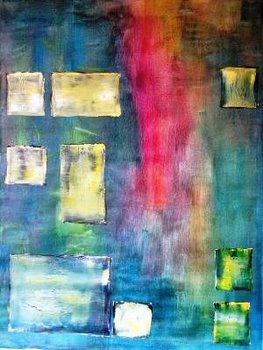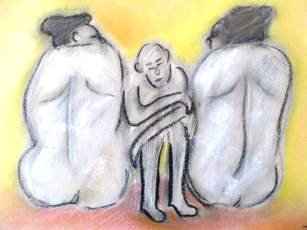LM Noonan has tagged me for a little exercise in "getting to know who we are":
To begin with:
1. I have to post these rules before I give you the facts.
2. Each player starts with eight random facts/habits about themselves.
3. People who are tagged need to write their own post about their eight things and display these rules.
4. At the end of your post, you need to choose eight people to get tagged and list their names.
5. Don’t forget to leave them a comment telling them they’re tagged, and to read your blog.
So, here are my eight little titbits:
1. I don't eat meat. I stopped eating red meat when I was about 20, limiting myself to chicken and fish. When I moved to Europe at the age of 25 I stopped eating all meat and fish. However, in 2000, after two and a half years in France, and finding it hard to find things to eat in restaurants etc, I started eating fish again - but not chicken. I only eat fish that doesn't really taste to me like fish (salmon, tuna). It's not a natural instinct for me to want to cook, chew and swallow meat, and I never liked the taste of it.
2. I used to have a mild stammer and a stutter when I was a child, probably caused by the fact that I had so much to say and spoke too fast. It became less severe as I got older but I still had some terrible times in my teenage years. I avoided words starting with k, m, s, r, among others, and always had alternatives up my sleeve if a word refused to leave my mouth (good vocabulary skills). I had a breakthrough in high school though: I discovered I didn't have any problem when speaking in front of large groups doing speeches, debating etc. I tried to emulate this 'public speaking' style in my everyday speech and things ended up improving dramatically. I went on to work as a radio reporter/presenter (and later television), which probably surprised those who remembered me as the poor kid who stammered.
3. I discovered a few years ago, via my "better half", that I have what is known as "restless foot syndrome". This means that during the night my feet shake and I sometimes kick out. Not nice for the person beside me. I also don't understand how Miss Muffin is quite happy to keep sleeping at the foot of our bed during the night. I don't think this condition is all that serious and I've never sought medical advice about it. I think it has something to do with circulation and the electrical system "unwinding". I hope so.
4. I am a "born-again" grammar fanatic. I developed a big interest in correct grammar when I started to learn French. Basically, for me, it was important to know English grammar inside out in order to learn how everything worked in French. Before learning French, I had to relearn English. I like the idea of breaking the rules though - deliberately - for effect. I also love introducing new words into the language. I love grammar that makes writing more interesting and breaks things up into more interesting parcels, with more interesting rhythms.
5. I have never been anyone's fan. Right from an early age I hated the whole concept of people idolising someone else: singers, authors, personalities. I have maintained this throughout my life and can never understand the "mania" that surrounds celebrity figures. For me, people are just people. Of course, I wouldn't mind if someone decided to become my fan!
6. I bite my nails. It's a terrible, disgusting habit, which just won't go away. I bite right down to the sensitive skin, until it hurts. I've bitten my nails for as long as I can remember. I tried those nasty-tasting lotions, but I always ended up liking the taste and got right back to chewing. Doctors say I probably have a very strong immune system due to the constant intake of bacteria. On the odd occasion that I have let my nails grow I couldn't bear it; I had the constant sensation that my nails were being dragged down a blackboard.
7. I am a manic checker. I check to see if the front door is locked several times before I'm satisfied that it really is locked. I will often get up out of bed to go and double check. I will often walk back to my car to double check that I've locked it. I always push the button on the remote a few times before I'm satisfied that it's locked. When I'm driving I keep pushing the buttons that operate the electric windows, to make sure that the windows are properly closed, with no little gap at the top. (After a real effort in recent months, I'm happy to say that I now do this less often).
8. I hate it when people talk at the cinema. I need to have total silence during a film and can't bear to be with someone who talks to me during a movie. Even one little comment will drive me crazy. I need to be totally immersed in the universe the film has created and I get irritated if I am taken out of that. I lost a potential friend once when I told him how annoyed I was at his non-stop, banal commentary during a film.
Yes, I know, I am dangerous and unstable! I should be committed!
Now, I tag these people from my sidebar to see what they have to reveal about themselves:
Cate Sweeney.
Doors Left Open.
Skint Writer.
Good Thomas.
Kat's Random Thoughts.
Locution.
Once In A Blue Muse.
Word Carving.






















































